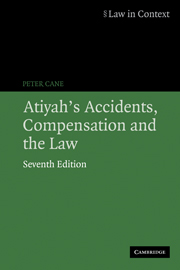Book contents
- Frontmatter
- Contents
- Preface
- List of abbreviations
- List of tables
- Table of legislation
- Table of cases
- Part One The Issues in Perspective
- Part Two The Tort System in Theory
- Part Three The Tort System in Operation
- Part Four Other Compensation Systems
- 11 First-party insurance
- 12 Compensation for criminal injuries
- 13 The social security system
- 14 Other forms of assistance
- Part Five The Overall Picture
- Part Six The Future
- Index
12 - Compensation for criminal injuries
Published online by Cambridge University Press: 05 June 2012
- Frontmatter
- Contents
- Preface
- List of abbreviations
- List of tables
- Table of legislation
- Table of cases
- Part One The Issues in Perspective
- Part Two The Tort System in Theory
- Part Three The Tort System in Operation
- Part Four Other Compensation Systems
- 11 First-party insurance
- 12 Compensation for criminal injuries
- 13 The social security system
- 14 Other forms of assistance
- Part Five The Overall Picture
- Part Six The Future
- Index
Summary
Tort claims
Victims of criminal offences causing personal injury can claim in tort against the criminal, but in the great majority of cases the criminal would not be worth suing. In its Third Report, the Criminal Injuries Compensation Board (CICB) (now the Criminal Injuries Compensation Authority (CICA)) reported that it had found the number of cases in which offenders would be worth suing to be seventeen, i.e. 0.7% of the cases which had by then come before the Board. By the time of the Seventh Report the number had dropped to 6 out of nearly 6,000 cases, i.e. about 0.1%. Just occasionally, tort liability may be established against someone other than the offender personally. For instance, the offender's employer may be vicariously liable in cases of fraud. In cases of personal injury, such liability will not often be established because criminal assaults and similarly violent conduct will not often be regarded as within the course of the offender's employment (so as to render the employer vicariously liable), but it may be in some cases.Personal tort liability may occasionally be imposed on the victim's employer, for example, where it is alleged that the employer had exposed the victim to unnecessary risk of criminal attack, for example, by sending a young woman to the bank to collect wages for a company's employees. As a general rule, the police cannot be sued by victims for allegedly negligent failure to apprehend criminals or to prevent crime.
- Type
- Chapter
- Information
- Atiyah's Accidents, Compensation and the Law , pp. 300 - 327Publisher: Cambridge University PressPrint publication year: 2006

